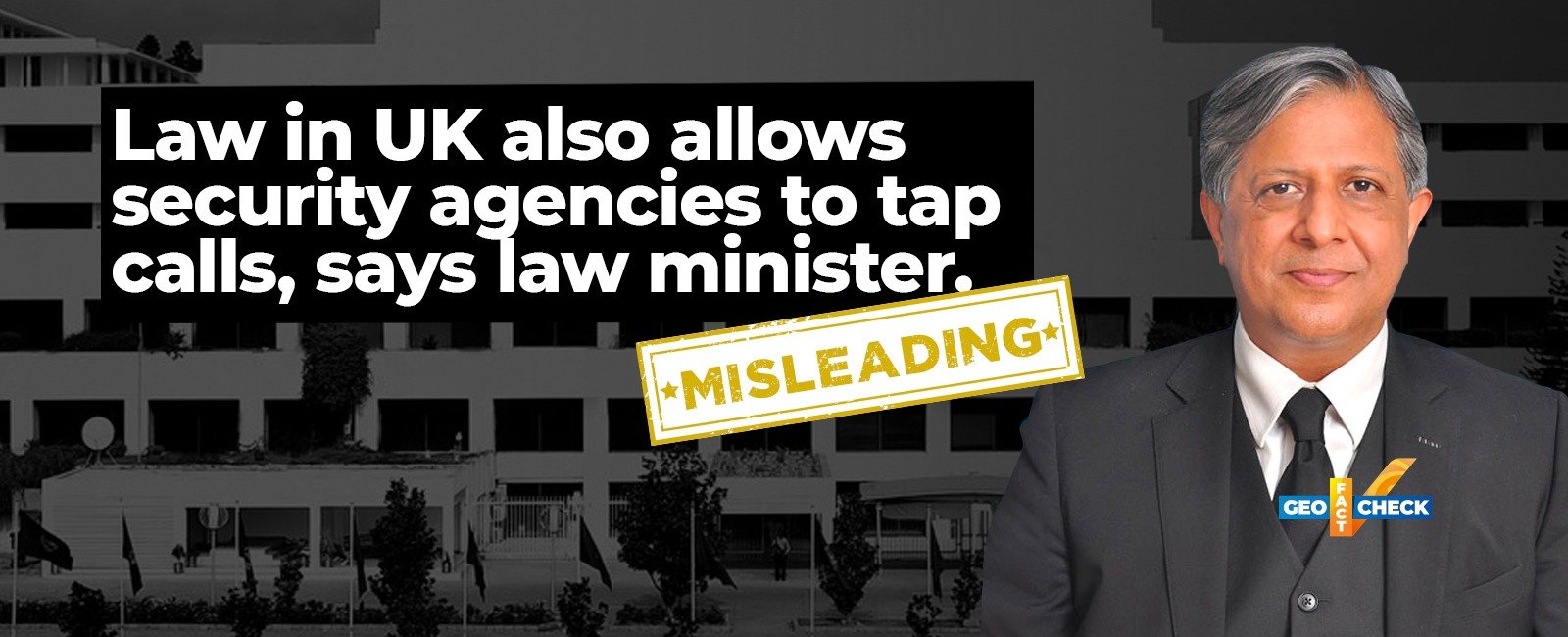Fact-check: Law minister's comparison of ISI phone tapping powers to UK legislation is misleading
Lawyers clarify that security agencies in the United Kingdom do not have blanket powers for the surveillance of citizens

The federal minister for law, Azam Nazeer Tarar, defended the government’s recent decision to allow a spy agency to tap phone calls in the “interest of national security,” claiming that the United Kingdom has similar provisions that authorise security agencies to intercept phone calls.
The claim is misleading and omits important context.
Claim
On July 9, during a debate in the national assembly about the government authorising the Inter-Services Intelligence (ISI) to intercept calls and messages or trace calls of private citizens in the “interest of national security,” the law minister said that the government in the UK has also granted its intelligence agencies similar powers.
His exact words were: “The mother of democracy, where we drive common law jurisdiction, even there, even in the United Kingdom, their law the Telecommunications (Lawful Business Practice) (Interception of Communications) Regulations 2000, has the same things in it.”
A similar argument was made by Defence Minister Khawaja Asif on July 10 on a show on Geo News.
Asif said that in "big developed countries" like the United States and the United Kingdom "such things happen under the umbrella of national security”.
Fact
Lawyers, Geo Fact Check spoke to, clarify that security agencies in the UK do not have blanket powers for the surveillance of citizens and any such requests are subject to strict civilian and judicial oversight.
Muhammad Shafeeque Chaudhry, a London-based lawyer, told Geo Fact Check over the phone that UK’s Telecommunications (Interception of Communications) Regulations 2000 – which the law minister referred to – only deals with allowing businesses to monitor communications on their own networks without the consent of the user. The law, he added, was not about security agencies.
In fact, the Regulation of Investigatory Powers Act 2000 (Ripa) actually governs the surveillance of private individuals in the UK by public bodies, Chaudhry said. But even under Ripa, surveillance has to be undertaken in a manner which protects the public and their human rights.
“Ripa aims to ensure that when [government] organisations want to use covert techniques to investigate private individuals, they must show the use of such techniques are justified,” he said, adding that in order to safeguard the human rights of individuals, Ripa includes provisions which place strict limits on the organisations and people which are allowed to use covert surveillance techniques.
Not only that, the lawyer explained that warrants are also required from courts before any kind of surveillance can be undertaken.
Lahore-based lawyer Asad Jamal shared a similar view.
In the UK, Jamal explained, the secretary of state must be satisfied that there is a necessity and that the action to be taken (ie, interception, duration, and scope) is proportionate to the facts presented by spy agencies such as MI5.
“Only then would the secretary issue a warrant for surveillance, which must also be approved by the Investigatory Powers Commissioner’s Office (Ipco) and in certain cases by an independent judge of the senior judiciary acting as Judicial Commissioner,” he said.
Jamal added that the Ipco independently authorises and then oversees whether the powers granted to law enforcement or intelligence agencies for investigation, by interception of communications, are used in accordance with law and in the public interest.
The Ipco in the UK is a body that comprises inspectors, authorising officers, lawyers and policy officials.
Jamal also said that previous law in the UK, therefore the Ripa, has undergone significant changes since 2016 with the introduction of the Investigatory Powers Act 2016.
While the notification issued by the Pakistani government granting powers to ISI to tap phone calls, under sec 54 of the Pakistan Telecommunication Re-Organisation Act 1996, “doesn't mention that there will be any independent oversight and accountability for abuse or violation of the right to privacy and dignity,” the lawyer said.
Follow us on @GeoFactCheck. If our readers detect any errors, we encourage them to contact us at [email protected]





